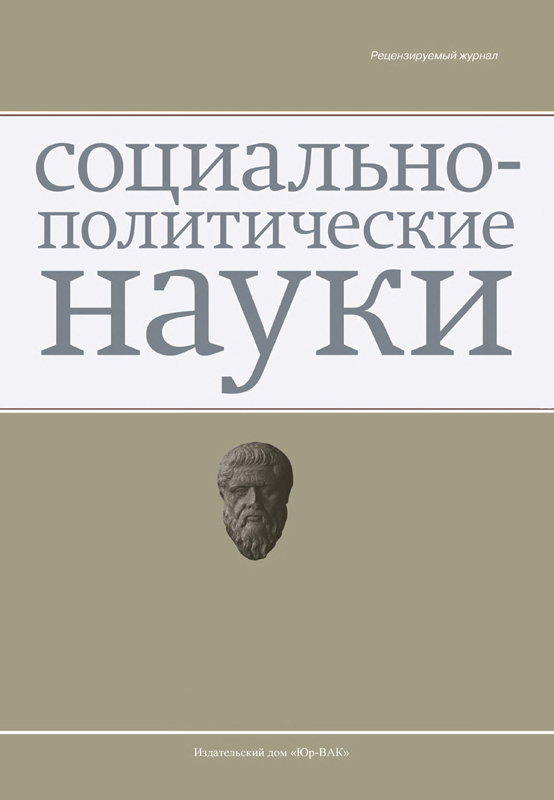The State and Problems of the Modern Palestinian Political Regime
- Autores: Kerimov A.A.1, Ferasb A.1
-
Afiliações:
- Ural Federal University named after B.N. Yeltsin
- Edição: Volume 12, Nº 5 (2022)
- Páginas: 23-30
- Seção: Articles
- URL: https://journals.eco-vector.com/2223-0092/article/view/535756
- DOI: https://doi.org/10.33693/2223-0092-2022-12-5-23-30
- ID: 535756
Citar
Texto integral
Resumo
The relevance of the study is determined by the need to understand the state and problems of the political regime of the Palestinian National Authority. The Palestinian regime has recently been in a state of permanent crisis. The reasons for this crisis are the lack of State sovereignty, unresolved political, socio-economic problems of the Palestinian society, as well as the fragmentation of political forces, the lack of consensus among the local elite on the most important issues. The article examines the problems of Palestinian statehood, identifies the reasons preventing the creation of a sovereign state. The emphasis is placed on intra-Palestinian problems, for this reason, the foreign policy aspects of the problem are less affected in this article. Based on various approaches, the article analyzes the positions of the actors of the Palestinian political regime, identifies contradictions inherent in the Palestinian political process. The authors consider the current situation as unfavorable for the constructive scenario of the development of events. The split of the country into two enclaves, the confrontation of the two main forces - Fatah and Hamas, the difficult socio-economic situation of the Palestinians, the fragmentation of Palestinian society complicate the task of overcoming the crisis and achieving the main goal of the Palestinian people - the creation of their own state. The methodological basis of the article is the theoretical developments of Arab, Russian and foreign researchers. The work uses general philosophical and socio-humanitarian methods. The empirical data used in the work are taken from open sources.
Palavras-chave
Texto integral
Sobre autores
Alexander Kerimov
Ural Federal University named after B.N. Yeltsin
Email: kerimov68@mail.ru
Dr. Sci. (Polit.), Associate Professor; Professor at the Department of Political Sciences Yekaterinburg, Russian Federation
Alfedeylat Ferasb
Ural Federal University named after B.N. Yeltsin
Email: alfedeilat.firas@yahoo.com
candidate at the Department of Political Sciences at the Department of Political Sciences Yekaterinburg, Russian Federation
Bibliografia
- Abdel S.K. A study of the foundations of Palestinian-Israeli security measures. Nablus: National Palestinian University An-Naja. 2018. Pp. 22-26.
- Alivaivi A.M. The Palestine Liberation Organization in the perspective of the proclamation of an independent State of Palestine. Problems of Modern Science and Education. 2014. No. 5 (23). Pp. 118-128. (In Rus.)
- Al-Jarbawi A. Critical pause with the experience of Palestinian development. Ramallah: Center for Palestinian Studies, 1991. Pp. 31-37.
- Al-Qaddumi warns Abbas through Al-Ahmad: Do not touch the political department of the PLO, otherwise… Palestine Today. 24.08.2009. (In Arabic) [Electronic resource]. URL: https://paltoday.ps/ar/post/56101/
- Bartenev V.I. “New course” of assistance to “unstable states”: Origins, components, prospects. Bulletin of the Moscow University. Ser. 25: International relations and world politics. 2012. No. 4. Pp. 113-143. (In Rus.)
- Bartenev V.I. Assistance to “fragile states” through the prism of risk management. Labyrinth of explanatory hypotheses. International Processes. 2018. Vol. 16. No. 4 (55). Pp. 20-41. (In Rus.)
- Kerimov A.A., Rabaya F.M. The role of the Hamas movement in the creation of a Palestinian state: Ideology and practice. News of Saratov University. A New Series. Series: Sociology. Political Science. 2021. Vol. 21. Issue 1. Pp. 95-101. (In Rus.)
- Kosach G.G. The Palestine Liberation Organization: the path to the creation of national statehood. In: Middle East and modernity: Collection of articles. Issue 11. Moscow, 2001. Pp. 142-164.
- Mamdouh N. The problem of relations between the Palestinian Authority and the PLO and ways to solve it. Journal of Palestinian Studies. 1995. Vol. 6. No. 22. Pp. 46-58. (In Arabic)
- Marwan A.-A. PLO: Reality and prospects - Popular Front for the Liberation of Palestine. In: Palestine Liberation Organization: Assessment of experience and reconstruction. Beirut: Al-Zaytoun Research and Consultation Center, 2018. P. 206.
- Makhmutova M.I. The inter-Palestinian conflict between Fatah and Hamas (2006-2019). Conflictology /Nota Bene. 2019. No. 2. Pp. 3-46. (In Rus.)
- Muhammad A.A.-R. Duplication of the Palestinian political regime. Dunii Al-Watan. (In Arabic) [Electronic resource]. URL: https://pulpit.alwatanvoice.com/content/print/91469.html
- Letters of recognition of Israel and the Palestine Liberation Organization - Israel-Palestine Liberation Organization letters of recognition [Electronic resource]. URL: https://wikidea.ru/wiki/Israel%E2%80%93Palestine_Liberation_Organization_letters_of_recognition
- Rabaya F. The problem of creating a Palestinian state at the turn of the XX-XXI centuries: Actors, strategies, prospects: Dis. ... Cand. Sci. (Polit.): 23.00.02. Yekaterinburg, 2021. 179 p
- About membership: Archived copy. Official website of UN. 2012 [Electronic resource]. URL: https://www.un.org/ru/members/about.shtml
- Khlebnikova L.R. US policy on strengthening statehood in the Palestinian territories (2001-2017). USA and Canada: Economics, Politics, Culture. 2018. No. 7 (583). Pp. 92-106. (In Rus.)
- Epstein A.D. Israelis and Palestinians: from confrontation to negotiations and back. Moscow-Jerusalem: Bridges of Culture/Gesharim, 2009. 191 p.
- Constitution of the State of Palestine. Third Draft, March 7, 2003, revised in March 25, 2003. Archive of the Ministry of Foreign Affairs, Ramallah, Palestine [Electronic resource]. URL: https://asianparliament.org/uploads/Country/Members/Palestine/PalestineConstitution-Eng.pdf
Arquivos suplementares









